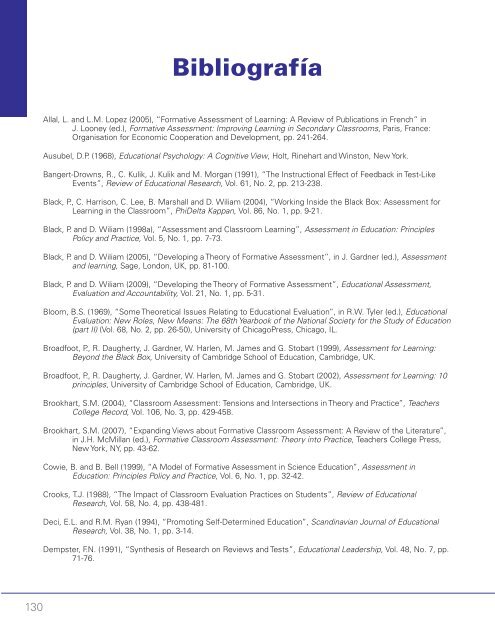del aprendizaje
s0eH3032Q2U
s0eH3032Q2U
You also want an ePaper? Increase the reach of your titles
YUMPU automatically turns print PDFs into web optimized ePapers that Google loves.
Bibliografía<br />
Allal, L. and L.M. Lopez (2005), “Formative Assessment of Learning: A Review of Publications in French” in<br />
J. Looney (ed.), Formative Assessment: Improving Learning in Secondary Classrooms, Paris, France:<br />
Organisation for Economic Cooperation and Development, pp. 241-264.<br />
Ausubel, D.P. (1968), Educational Psychology: A Cognitive View, Holt, Rinehart and Winston, New York.<br />
Bangert-Drowns, R., C. Kulik, J. Kulik and M. Morgan (1991), “The Instructional Effect of Feedback in Test-Like<br />
Events”, Review of Educational Research, Vol. 61, No. 2, pp. 213-238.<br />
Black, P., C. Harrison, C. Lee, B. Marshall and D. Wiliam (2004), “Working Inside the Black Box: Assessment for<br />
Learning in the Classroom”, PhiDelta Kappan, Vol. 86, No. 1, pp. 9-21.<br />
Black, P. and D. Wiliam (1998a), “Assessment and Classroom Learning”, Assessment in Education: Principles<br />
Policy and Practice, Vol. 5, No. 1, pp. 7-73.<br />
Black, P. and D. Wiliam (2005), “Developing a Theory of Formative Assessment”, in J. Gardner (ed.), Assessment<br />
and learning, Sage, London, UK, pp. 81-100.<br />
Black, P. and D. Wiliam (2009), “Developing the Theory of Formative Assessment”, Educational Assessment,<br />
Evaluation and Accountability, Vol. 21, No. 1, pp. 5-31.<br />
Bloom, B.S. (1969), “Some Theoretical Issues Relating to Educational Evaluation”, in R.W. Tyler (ed.), Educational<br />
Evaluation: New Roles, New Means: The 68th Yearbook of the National Society for the Study of Education<br />
(part II) (Vol. 68, No. 2, pp. 26-50), University of ChicagoPress, Chicago, IL.<br />
Broadfoot, P., R. Daugherty, J. Gardner, W. Harlen, M. James and G. Stobart (1999), Assessment for Learning:<br />
Beyond the Black Box, University of Cambridge School of Education, Cambridge, UK.<br />
Broadfoot, P., R. Daugherty, J. Gardner, W. Harlen, M. James and G. Stobart (2002), Assessment for Learning: 10<br />
principles, University of Cambridge School of Education, Cambridge, UK.<br />
Brookhart, S.M. (2004), “Classroom Assessment: Tensions and Intersections in Theory and Practice”, Teachers<br />
College Record, Vol. 106, No. 3, pp. 429-458.<br />
Brookhart, S.M. (2007), “Expanding Views about Formative Classroom Assessment: A Review of the Literature”,<br />
in J.H. McMillan (ed.), Formative Classroom Assessment: Theory into Practice, Teachers College Press,<br />
New York, NY, pp. 43-62.<br />
Cowie, B. and B. Bell (1999), “A Mo<strong>del</strong> of Formative Assessment in Science Education”, Assessment in<br />
Education: Principles Policy and Practice, Vol. 6, No. 1, pp. 32-42.<br />
Crooks, T.J. (1988), “The Impact of Classroom Evaluation Practices on Students”, Review of Educational<br />
Research, Vol. 58, No. 4, pp. 438-481.<br />
Deci, E.L. and R.M. Ryan (1994), “Promoting Self-Determined Education”, Scandinavian Journal of Educational<br />
Research, Vol. 38, No. 1, pp. 3-14.<br />
Dempster, F.N. (1991), “Synthesis of Research on Reviews and Tests”, Educational Leadership, Vol. 48, No. 7, pp.<br />
71-76.<br />
130


